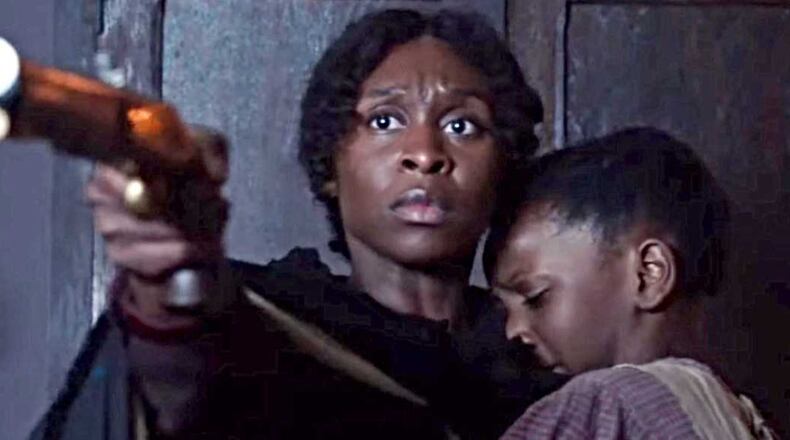Originally posted Wednesday, October 30, 2019 by RODNEY HO/rho@ajc.com on his AJC Radio & TV Talk blog
Harriet Tubman was an escaped slave who emancipated hundreds of others over a decade span before the Civil War. She traveled hundreds of miles, mostly by foot, successfully evading angry slave owners and chasers. Her story has been become the stuff of legend in numerous children's books, textbooks and biographies.
But it's something else to capture her essence on film. Focusing on her younger years building the Underground Railroad, "Harriet" out Friday attempts to highlight her incredible bravery, athleticism, smarts and determination. British actress Cynthia Erivo, who plays Tubman, is already getting Oscar buzz for her portrayal.
Film director and co-writer Kasi Lemmons said in an interview that Tubman over the years was often painted in fable-like fashion over the years, like the fictional Paul Bunyan. Lemmons wanted to humanize her, turn her into flesh and blood. Lemmons was sure Tubman possessed special mystical powers of intuition, but she also suffered great pain and agony over family loss and betrayal.
“The most profound part of her to me was her spirituality,” said Lemmons. “I didn’t really look at her as a mystic but I do now.”
And while the film shows off Tubman’s super-heroic attributes, Lemmons wanted to embrace her “black woman-ness. She used her pain to make herself stronger. She was able to move past her heartbreak and stay driven and motivated. In fact, it was her loneliness that motivated her in the first place.”
The fact Tubman had a gun was less about intimidating white people, she said, as to “encourage reluctant freedom seekers in case they got cold feet,” Lemmons said. (A scene in the film dramatically illustrates that.)
At least three of the actors in the film have strong Georgia ties:
- Decatur native Omar Dorsey ("Django Unchained," "Queen Sugar") plays a character that is the opposite of Tubman: he's Bigger Long, a mercenary free black man who helps track down errant slaves for white slave owners. And he does his job without any overt guilt or shame.
Dorsey, in an interview, said playing Bigger Long was difficult and finding the man’s humanity was a serious challenge. On the bright side, Dorsey’s charm makes him an oddly appealing bad guy.
- Another former Atlantan Jennifer Nettles of Sugarland fame plays the slave owner's wife Eliza and while she is hardly a sympathetic character, Lemmons tried to ensure the viewers understood her point of view. "She sees herself as a victim more than Harriet Tubman's nemesis," she said.
Eliza lived in a world where black people were assets, not people. “It took these people serious mental gymnastics to think this was morally okay,” Lemmons said. “But this was their mentality and cotton was the industry of the South.”
- Atlanta musician and R&B star Janelle Monae ("Hidden Figures," "Moonlight") played a small but crucial role as a supportive free woman in Philadelphia who housed Tubman and became her friend.
Erivo, as Tubman, not only looked like Tubman but she captured her essence, Lemmons said: “She matched Tubman’s size, stature and muscularity - even her cheekbones and her voice. She came on set every day as prepared as anyone I’ve ever met. She knew her lines. She worked out so she would be prepared physically. She did almost all her stunts herself. It was a wonderful actor/director relationship.”
This was not a big-budget film so Lemmons had to literally make lemonade out of budgetary lemons. “It was a little bit of a panic every day to make the schedule and just get it all in,” she said. “We happened to shoot during the wettest autumn in Virginia in 100 years. We were cold and wet and muddy.” Hurricane Florence even came by and temporarily shut down production.
“Some actors ran through a hive of ground hornets,” Lemmons said. “They were an angry swarm and stung everybody.”
But they tried to place their suffering in perspective. “Whenever anything felt difficult, we’d say, ‘What would Harriet think?’ “ Lemmons said. “We had vans and trailers we could go to between takes. She was exposed to the elements all the time, She would do a lot of her work in the fall and winter because the nights were longer.”
And did Lemmons feel Tubman’s spirit during the shoot?
“Absolutely!” she said. “She was with me every day and for a long time before that. By the time I had done months of research, she was incredibly vivid to me. She was sitting next to me or holding my hands. I could feel her with me.”
IN THEATERS
“Harriet,” out Friday, November 1, 2019
About the Author
Keep Reading
The Latest
Featured




